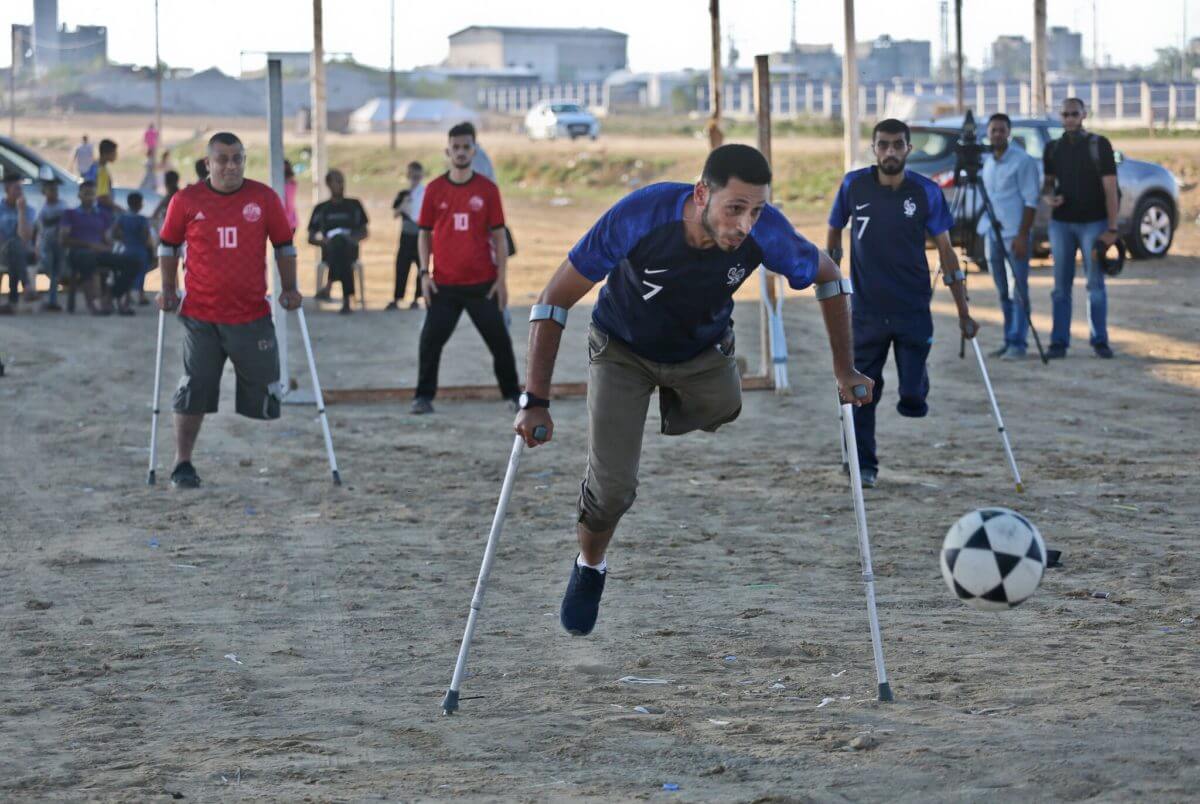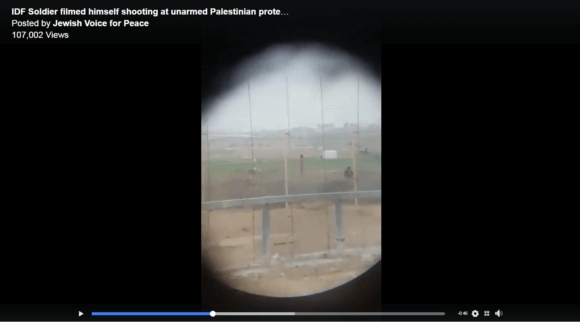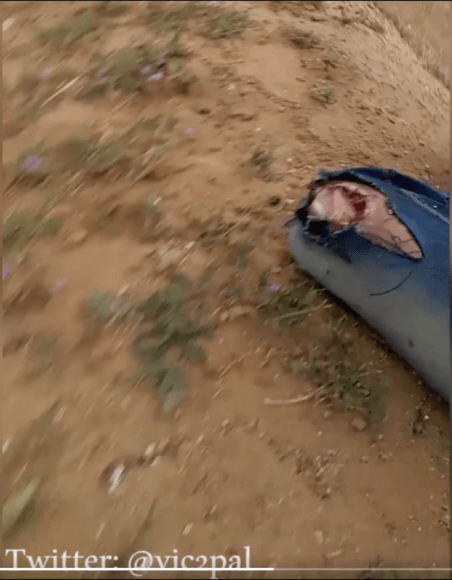‘I remember the knee in the crosshairs, bursting open’
– Israeli snipers boast of shooting ‘ducks’ in Gaza

Soccer players in Gaza in December 2018 show results of Israeli sniper fire. (Photo: Mohammed Asad)
Two days ago (Friday) a piece came out in Haaretz by Hilo Glazer, featuring stories from five anonymous snipers who told how they gunned down unarmed protesters at the March of Return near the Gaza perimeter fence.
These accounts are a jaw-dropper, constituting some of the most enraging as well as depressing readings I can recall. The language of the perpetrators of these massacres is testimony to the moral depravity of these young soldiers, who still seem to believe they are fulfilling a sacred duty to defend their country, as well as a damning account of the state and society that supports them and their crimes.
These are not shamed confessions: the snipers appear to be boasting about their “hits”, in competition over the number of knees they can claim to have shot to pieces. And Israeli officials often say that their army is the “most moral army in the world.”
Let’s start with the knees.
Knees are a hard thing to rack up
“I kept the casing of every round I fired,” says one of them. “I have them in my room. So I don’t have to make an estimate – I know: 52 definite hits.”
Is 52 a lot?, Ido Glazer asks.
“I haven’t really thought about it. It’s not hundreds of liquidations like in the movie ‘American Sniper’: We’re talking about knees. I’m not making light of it, I shot a human being, but still …”
Where do you stand in comparison to others who served in your battalion?
“From the point of view of hits, I have the most. In my battalion they would say: ‘Look, here comes the killer.’ When I came back from the field, they would ask, ‘Well, how many today?’ You have to understand that before we showed up, knees were the hardest thing to rack up. There was a story about one sniper who had 11 knees all told, and people thought no one could outdo him. And then I brought in seven-eight knees in one day. Within a few hours, I almost broke his record.”
Not “shooting and crying”
Glazer notes that this is not what is known as “shooting and crying”, a reference to the book that came out in the wake of the 1967 war called “The Seventh Day” (Amos Oz was a main interviewer there), where kibbutzniks unburdened themselves with stories from the war. This kind of soul-searching vein used to be considered a sign of moral fortitude in Israel, because our soldiers don’t just shoot – they also cry, and therefore we are the most moral in the world. No, not here. Glazer:
“More than half a century later, the lament of soldiers returning from the battlefield is still being heard, but at least according to the voices quoted here, their ideological and moral foundations have turned inside out. The soul-searching over the cost in blood has been replaced by criticism of the army’s weakness and the feeling that it is shackling its fighters.”
Neither is it “Breaking the Silence”, Glazer notes, referring to the organization that gathers combat soldier stories in order to create moral opposition to the 1967 occupation:
“They are not out to ‘break the silence’ or to atone for their deeds, only to relate what happened from their point of view.”
The IDF transforms guys into baboons
Indeed, there is hardly any sense of contrition in these accounts. They also celebrate their hits.
Glazer notes that “a video clip that circulated in 2018 showed a Palestinian approaching the fence and being shot by a sniper, as the soldiers celebrated the direct hit with shouts of ‘Right on!’ and ‘What a fab clip!’”.

Freeze frame of video shot through rifle scope of Israeli sniper shooting unarmed Palestinian on Gaza border and then celebrating. 2018.
It turned out that the clip had been filmed in December 2017, before the March of Return began. The video filmed through the sniper scope showed the targeting of a completely motionless protester. The targeting of unarmed protesters who pose no immediate danger with live ammunition is of course a war crime. But according to the snipers, there was a logic in targeting them when they were motionless:
“In that period [early during the protests], you were allowed to shoot a major inciter only if he was standing still,” one sniper says. “That means, even if he was walking around calmly, shooting was prohibited, so we wouldn’t miss and waste ammunition”.
Imagine that. By normal laws and ethics, a person has to be mortally threatening you for you to target them with lethal ammunition. But here it’s all reversed. They need to be standing still, not even “walking around calmly” – because what’s important is not to waste those bullets when shooting what they call “ducks”. Never mind those legs, those lives, those “ducks” – just don’t waste bullets.
In the wake of that video, Defense Minister Avigdor Lieberman opined that the soldiers should get a medal for fulfilling their military duty – while allowing that they should not have filmed the celebrations. That same logic is inherent in the snipers cited by Glazer. One sniper says that the soldiers’ celebration in the video merely “attests to a lack of professionalism and too much enthusiasm”.
“On the other hand, I think it’s human,” he says. “When you have a certain goal, even if you are shooting arrows at a target, obviously there’s joy at the hit. The soldiers’ mistake was in their behavior. Let them laugh somewhere in the back, but don’t make a clip of it. There’s such a thing as appearances, too.”
Glazer wonders: “Do you have to celebrate? Isn’t there some other way?”
Sniper: “No. Take the most baboonish guy you know – and that’s what the IDF does, transforms kids into baboons – and try to stop him from telling about his first time. It’s chaos there, everyone is shooting, making hits – you expect that he won’t open a bottle of champagne? He has fulfilled himself just now, it’s a rare moment. Actually, the more he does it, the more indifferent he’ll become. He will no longer be especially happy, or sad. He’ll just be.”
Pornography of violence
So, for these Israeli snipers, targeting an unarmed, motionless Palestinian protester who poses no immediate danger is like sex, and you can’t stop a sniper from celebrating that first time. Destroying people’s lives by blasting their knees is apparently exciting and shows one’s manhood, and there’s that count again:
“On that day [May 14th 2018, when the US Embassy in Jerusalem was inaugurated] our pair had the largest number of hits, 42 in all. My locator wasn’t supposed to shoot, but I gave him a break, because we were getting close to the end of our stint, and he didn’t have knees. In the end you want to leave with the feeling that you did something, that you weren’t a sniper during exercises only. So, after I had a few hits, I suggested to him that we switch. He got around 28 knees there, I’d say.”
There are also big expectations to fulfil:
“Standing above me is the battalion commander, to my left is his deputy, to the right the company commander – soldiers all around me, the whole world and their wife are watching me in my first go. Very stressful. I remember the view of the knee in the crosshairs, bursting open.”
These snipers know that their shots can “detach a leg”. Glazer cites a sniper who says he used M24 and Barak (HTR-2000) rifles: “With the Barak, if you shoot someone in the knee, you don’t incapacitate him – you detach his leg. He could die from loss of blood.”
There are also stories of such deaths. Glazer cites Tuly Flint, a health officer in the reserves, who describes a sniper from an elite unit who aimed at a demonstrator’s knee but hit too high, and the demonstrator died from loss of blood:
“That soldier, a sniper who was very dedicated to his mission, describes watching the demonstrator bleed to death. He can’t forget the man’s screaming not to be left alone”.
And it seems they can’t get enough of this: “Can I add another knee for this afternoon?”, they sometimes ask the commander.
A sniper asks for permission to ‘blow open’ the head of a 14-year old in front of his family
One of the soldiers tells about asking if he could blow the head of kid open:
“After some time… in a debriefing, I said: ‘Let me just once take down a kid of 16, even 14, but not with a bullet in the leg – let me blow his head open in front of his whole family and his whole village. Let him spurt blood. And then maybe for a month I won’t have to take off another 20 knees.’ That is shocking mathematics on the brink of the unimaginable – but when you don’t use your capabilities it’s not clear what you’re trying to do there. You ask me what my mission was? Walla, it’s hard for me answer you. What was considered a success from my point of view? Even the number of knees I took out wasn’t dependent on me, it derived from the number of ‘ducks’ that chose to cross the line.”
But to kill a kid at random? Do you really think that’s the solution?
“Obviously, we shouldn’t liquidate kids. I was saying that to make a point: that if you kill one you might be sparing 20 others.”
So these snipers think they are restrained, and being restrained by the army. By this logic they could have actually saved lives, by killing a ‘duck’, and it would be humane.

Screenshot from video of Palestinian footballer Mohammed Khalil filming himself the moment he is shot in his knee by Israeli forces, putting an end to his career. April 2018.
Targeting “major inciters”
“Major inciter” is a term used to justify targeting with lethal ammunition of an unarmed protester, because they are supposedly leading the protest and are thus key to stopping it. A sniper explains:
“Major inciters are, for example, people who stand around in the back, arranging things. They are not necessarily a target, but to let them know that we see what they’re doing, I would shoot in the air around them. You know, the one who arms others is not a concrete threat to me, at least not directly, but he makes things happen. So to hit him is a problem, but also not to hit him is a problem. That’s why the moment he gets tired of activating others and starts to take an active part in the chaos, he’ll be the first one we hit, because he’s the most important in terms of the group around him. He’s the key to stopping the flare-up.”
And of course the “air around” such a “major inciter” can be bustling with other Palestinian civilian unarmed protesters, and if the sniper happens to hit one of them – well, that’s just collateral.
Israel maintains that the shooting is basically towards the legs, and that the directives have also been changed in time, to shoot lower than the knee. The narrative says that if you shot higher it was a mistake. But one of the snipers says that “there are snipers, not many, who ‘choose’ to make mistakes”. As if blowing a person’s leg off was not enough, you can always make that “mistake”, and– too bad. And when you fire such lethal ammunition at civilian crowds, also real mistakes can happen, and kids die. The health officer is cited telling about such a case:
“There are awful, dreadful stories about soldiers who aimed at a demonstrator and hit someone else. I know someone who took aim at one of the leaders of a demonstration, who was standing on a box and urging the people to keep marching ahead. The soldier aimed at his leg, but at the last moment the man moved and the bullet missed him. Instead, he hit a little girl, who was killed on the spot.”
The sniper who targeted “major inciters” inadvertently tells us the truth about the nature of these protests:
“You don’t hit those who whip up the crowd because of what they’re doing. It doesn’t come from an emotional place of ‘He’s the one who’s causing the uprising, so let’s take him down.’ This isn’t a war, it’s a Friday afternoon D.O. [disruption of order].”
Exactly. It’s not a war. It’s a largely non-violent civilian protest. But Israel is framing it as a war against terrorists, to justify its war crimes (even if there isn’t a war).
Shooting sheep
This reading is stomach-churning, it really is. It goes on and on. And it’s basically all descriptions of murderous Israeli policy, which most Israelis accept. But you know what isn’t ok for the Israeli army? Shooting a sheep. Glazer cites a story where a sniper was called in for patrol because of shepherds, who he says “work for Hamas and Islamic Jihad”:
“Even when there is no demonstration and everything seems calm, they rush you to the fence with the patrol when shepherds approach it. You have to understand, these are not innocent shepherds, they work for Hamas and Islamic Jihad in order to drive you crazy.”
And the solution to this “shepherd-terrorist” problem? Shooting a sheep:
“One day, one of the noncoms said to me, ‘Enough, we can’t go on like this, let’s take down one of his sheep, it’s worth a few thousand.’ Think about what leads a soldier, a musician from a good high school, the last kind of guy you’d say is out for blood, to get on the radio with the lookout and say, ‘Do you see a sheep, to the north? You’re going to see it fall.’ After that, the shepherd didn’t return. What’s the conclusion? The deterrence worked.”
The Israeli army responded to the Haaretz article, saying that “in the case where improper shooting at a sheep took place… the company’s deputy commander was tried for breaching military discipline and sentenced to seven days’ detention.”
If only Palestinians had the same rights as sheep.
H/t Dave Gaskell




Geen opmerkingen:
Een reactie posten